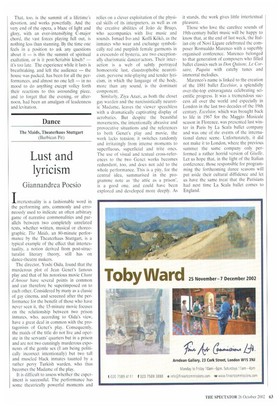Dance
The Maids, Theaterhaus Stuttgart (Barbican Pit)
Lust and lyricism
Giannandrea Poesio
Intertextuality is a fashionable word in the performing arts, commonly and erroneously used to indicate an often arbitrary game of narrative commonalities and parallels between two completely unrelated texts, whether written, musical or choreographic. The Maids, an 80-minute performance by the Theaterhaus Stuttgart, is a typical example of the effect that intertextuality, a notion derived from post-structuralist literary theory, still has on dance-theatre makers.
The director, Yoshi Oida, found that the murderous plot of Jean Genet's famous play and that of his notorious movie Chant d'Amour have several points in common and can therefore be superimposed on to each other. Considered by many as a classic of gay cinema, and screened after the performance for the benefit of those who have never seen it, the 15-minute movie focuses on the relationship between two prison inmates, who, according to Oida's view, have a great deal in common with the protagonists of Genet's play. Consequently, the maids of the title do not live and operate in the servants' quarters but in a prison and are not two cunningly murderous exponents of the gentle sex (I am being politically incorrect intentionally) but two tall and muscled black inmates taunted by a rather nervy Turkish warden, who thus becomes the Madame of the play.
It is difficult to assess whether the experiment is successful. The performance has some theatrically powerful moments and relies on a clever exploitation of the physical skills of its interpreters, as well as on the creative abilities of Joao de Bruco, who accompanies with live music and sounds. Ismael Ivo and Koffi K6ko, as the inmates who wear and exchange symbolically red and purplish female garments in a crescendo of hysteria, are two exceptionally charismatic dancer/actors. Their interaction is a web of subtly portrayed homoerotic lust, claustrophobic neuroticism, perverse role-playing and tender lyricism, in which the language of the body, more than any sound, is the dominant component.
Similarly, Ziya Azazi, as both the closet gay warden and the narcissistically neurotic Madame, leaves the viewer speechless with a dramatically captivating display of acrobatics. But despite the beautiful movements, the intentionally abrasive and provocative situations and the references to both Genet's play and movie, the work lacks tension; it switches randomly and irritatingly from intense moments to superfluous, superficial and trite ones. The use of visual and textual cross-references to the two Genet works becomes redundant, too, and does not add to the whole performance. This is a pity, for the central idea, summarised in the programme note as 'the attic as a prison', is a good one, and could have been explored and developed more deeply. As it stands, the work gives little intertextual pleasure.
Those who love the carefree sounds of 19th-century ballet music will be happy to know that, at the end of last week, the Italian city of Novi Ligure celebrated the composer Romualdo Marenco with a superbly organised conference. Marenco belonged to that generation of composers who filled ballet classics such as Don Quixote. Le Corsaire, Paquita with catchy tunes and immortal melodies.
Marenco's name is linked to the creation of the 1881 ballet Excelsior, a splendidly over-the-top extravaganza celebrating scientific progress. It was a tremendous success all over the world and especially in London in the last two decades of the 19th century. Excelsior, which was brought back to life in 1967 for the Maggio Musicale season in Florence, was presented last winter in Paris by La Scala ballet company and was one of the events of the international dance scene. Unfortunately, it did not make it to London, where the previous summer the same company only performed a rather horrid version of Giselle. Let us hope that, in the light of the Italian conference, those responsible for programming the forthcoming dance seasons will put aside their cultural diffidence and let us have the same treat that the Parisians had next time La Scala ballet comes to England.


















































































 Previous page
Previous page